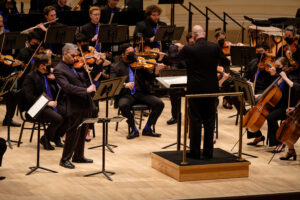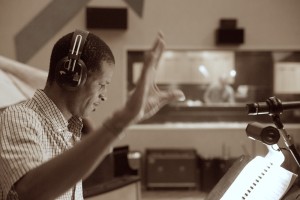
Big name soloists, a symphonic work plucked from obscurity and a premiere. It’s an oft-used – and winning – programming formula used by The Orchestra Now. The ensemble’s performance at Carnegie Hall on November 18, 2021 was the latest in this successful framework.
TŌN is a graduate program at Bard College founded in 2015 by Bard’s president, Leon Botstein, who is also the ensemble’s conductor. Its goal is to give conservatory graduates orchestral performance experience, training in communicating with the audience, and other essential skills for concert musicians. Throughout the concert at Carnegie, the quality of the performance was outstanding. It was easy to forget (as I did throughout the evening) that this is a pre-professional group, rather than a top-tier orchestra.
The violinist Gil Shaham struck a relaxed and confident pose in front of the orchestra for the New York premiere of Scott Wheeler’s Birds of America: Violin Concerto No. 2. Though it was brand-new music (commissioned by TŌN, who also gave the world premiere performance at Bard College the previous week), Shaham played it as naturally and familiarly as he might a Mozart or Mendelssohn concerto. There was nothing hackneyed about this new work, and yet it seemed like it had been in the repertoire for decades.
A springtime walk in Central Park provided both inspiration and specific ideas for Wheeler, including the sound of a downy woodpecker, emulated by the soloist knocking on the body of his instrument in the beginning of the final movement. Wheeler credits Shaham for the especially collaborative compositional process. The violinist suggested some particular references to bird sounds in the classical and jazz canon, as well as offering technical input. Though not always specifically identifiable, bird calls rang throughout the work, as did musical quotes ranging from Antonio Vivaldi to the jazz fiddler Eddie South.
Wheeler’s work was the highlight of the program, which also included two American composers whose music is rarely heard on the concert stage: Julia Perry and George Frederick Bristow.
Julia Perry (1924 – 1979) studied with Nadia Boulanger and Luigi Dallapiccola in Europe after attending the Juilliard School, Tanglewood and Westminster Choir College. Perry’s Stabat Mater, was sung exquisitely by the mezzo-soprano Briana Hunter, who earlier this fall appeared on the Metropolitan Opera stage as Ruby/Woman Sinner in Fire Shut Up in My Bones by Terrance Blanchard. The string orchestra accompaniment was often simple and unfussy, with a narrow melodic range that allowed Hunter’s rich and dynamic voice to infuse it with compelling drama. Perry was African-American, which seems important to point out in this era of focusing on diversity on the concert stage.
The final, and longest work on the 95 minute program was Bristow’s Symphony No. 4, Arcadian. It was the Brooklyn Philharmonic who commissioned the Brooklyn-born composer to write the work in 1872, making it the first symphony commissioned by an American orchestra from an American composer, according to the detailed program note written by JJ Silvey, one of TŌN’s oboists. Bristow’s music echoed the high romanticism and lush textures of Johannes Brahms – though somehow sounding not quite so German. The programmatic material, however, was through and through American, depicting settlers heading westward in the American frontier, with movements titled “Emigrants’ Journey Across the Plains”, “Halt on the Prairie”, “Indian War Dance”, and “Finale: Arrival at the New Home, Rustic Festivities, and Dancing”.
An especially memorable moment was the beautiful viola solo which launched the work and which returned twice more in the first movement, convincingly played by the principal violist Celia Daggy. The piece wore on just a bit too long, but it was a good trade off to have the opportunity to hear the music by this nearly forgotten 19th century composer.
The Orchestra Now has generously and conveniently made available a video performance of this entire program, livestreamed at the Fisher Center at Bard College. Watch it here.
